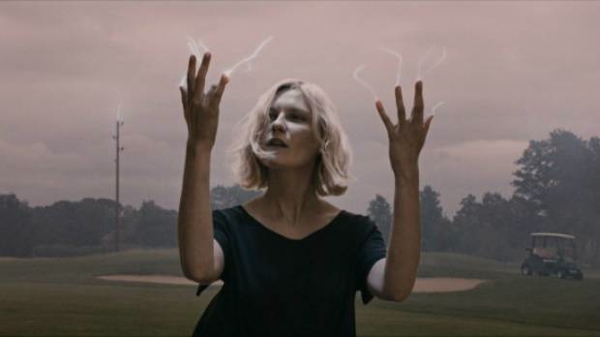Movie review by Greg Carlson
Perpetual provocateur Lars von Trier shares one of his least overtly “disobedient” stories in years with “Melancholia,” a visionary end-of-the-world disaster drama laced with a puckish streak of black comedy. Unlike controversial lightning rod “Antichrist,” the majority of the bile directed to “Melancholia” came not as a result of what appears on the screen, but instead for the moviemaker’s impolitic press conference at Cannes. Von Trier’s mouth drew attention from the work, a gorgeous elegy in which the notoriously unstable auteur explores the contours of his ongoing struggle with depression by imagining a collision between Earth and a “rogue” planet that has been hidden behind the sun.
Like Stanley Kubrick’s “Full Metal Jacket” and Wong Kar-wai’s “Chungking Express,” “Melancholia” is cleaved carefully, calculatingly in two, and each section of the luminous speculation on astronomical finality reflects significantly upon the other. The halves are named for sisters played by Charlotte Gainsbourg and Kirsten Dunst, physical near-opposites whose responses to impending oblivion and catastrophe are miles from the kind of action-oriented emergency operations undertaken by so many of the participants in cinematic cataclysms. In the most simplistic terms, Gainsbourg’s Claire takes care of Dunst’s Justine until the end is nigh and their roles reversed, but that description is a disservice to the beauty of the storytelling.
Justine, named by von Trier in homage to the Marquis de Sade’s doomed heroine, suffers tortures less physically graphic than her namesake, but the filmmaker – whose skillful character appellations often operate on multiple levels – might be simultaneously offering a rejoinder to the parade of detractors who accuse him of misogyny as a matter of presupposition and continuing in earnest his tradition of anguished female protagonists with whom he so closely identifies. In any case, Dunst completes the richest, most assured performance of her career. The startling image of wisps of electricity dancing from her fingertips places her in closer proximity to de Sade’s protagonist than first imagined.
The dissolution of Justine’s carefully planned wedding ceremony is rendered as a farcical chain of almost inexplicable breaches of formal social etiquette. Like Jonathan Demme’s “Rachel Getting Married,” the viewer is provided with an engraved invitation to one of civilization’s most fascinating rituals, and the mischievous director makes the most of assets like Stellan and Alexander Skarsgard, John Hurt, Charlotte Rampling, Kiefer Sutherland, and Udo Kier, whose pained wedding planner hilariously refuses to even look at the offending bride who is ruining “his” big day. For admirers, von Trier’s rehearsal-free approach to principal photography results once again in a dazzling series of exchanges. For the uninitiated, the vertiginous jump cuts and woozy, handheld shooting may provide ample torture.
J. Hoberman compared “Melancholia” to “The Tree of Life” in his earliest reports, calling both films “monumentally, even monstrously, ambitious” and coupling the statement with an assertion that there would be many viewers likely to turn away. Once Justine’s fairytale wedding has disintegrated like unexpurgated Grimm, von Trier cranks “Melancholia” into sharp focus through the lens of an expensive telescope and its homemade, bent wire companion. Both objects report the unthinkable. As the threat of death increases, however, Justine’s comportment evolves from numbed paralysis to serene tranquility and peacefulness. The glowing planet draws close, dominating the sky and our thoughts.
